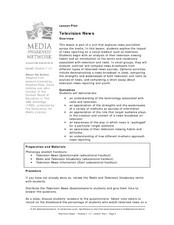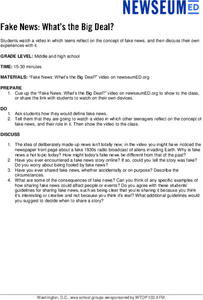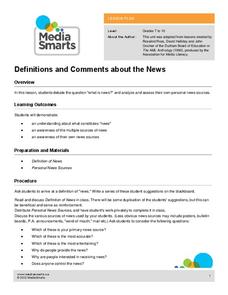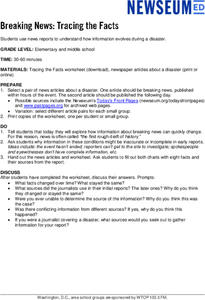Curated OER
Fighting Fake News
Fake news. Alternative facts. Internet trolls. In an age of Newspeak, it's increasingly important to equip 21st century learners with the skills needed to determine the legitimacy of claims put forth on social media, in print, and in...
Brown University
Analyzing the News
With so many ways to follow the news today, it is imperative to think critically about the sources of information we are turning to. Here is a fantastic graphic organizer that will help your learners develop the skills to properly...
Facing History and Ourselves
The Importance of a Free Press
"Congress shall make no law . . . abridging the freedom of speech, or of the press;. . ." Why is this guarantee of free speech and a free press the First Amendment to the US Constitution? Why are these rights so essential to a democracy?...
American Press Institute
Media Literacy: Where News Comes From
What actually happens at a press conference? Make sense of the mayhem with a mock press conference activity designed to promote media literacy. Individuals participate as either members of the press or the governor's office to examine...
Curated OER
Television News
Different media sources portray news in a variety of ways. In groups of three, learners look at different news sources, bringing in all the findings the next day. Three handouts help scholars compare sources, define specific terms used...
News Literacy Project
News Goggles: Covering a Newsworthy Trial
The trial of Derek Chauvin, former Minneapolis police officer charged in the death of George Floyd, is the focus of a lesson that asks pupils to compare how local, nationial, and international news organizations reported the testimony of...
Newseum
Fake News — What's the Big Deal?
In a time of fake news and alternative facts, young people must have the ability to identify it and its role. Scholars watch a video of teens reflecting on the concept of fake news and the impact of sharing fake news stories. They then...
Newseum
Covering a Catastrophe: Press Conference Simulation
Young journalists have an opportunity to experience the challenges of covering a catastrophe by staging a mock press conference. Half the class acts as reporters while the others act as officials from the mayor's office.
Media Smarts
Definitions and Comments about the News
Enable your class to construct a definition of the word "news" and compare it those provided from other sources. The activity, worksheet, and discussion that ensues would make a strong introduction to any media study you undertake.
Deliberating in a Democracy
Free and Independent Press
Learners determine how free press principles can be compromised. For this global studies lesson, students read an article titled "Free and Independent Press." Learners respond to discussion questions regarding the article.
Associated Press
AP News
A respected source of local and global news, you can trust this app to provide breaking stories and current events. The interface is highly visual and easy to navigate.
Facing History and Ourselves
Citizen Watchdogs and the News
To conclude their case study of media coverage of the shooting of Michael Brown by a Ferguson, Missouri, police officer, class members consider the role of citizen watchdogs in a democratic society, develop strategies for combating...
PBS
Broadcast News
Just because a story is on the news doesn't mean it's being presented fairly. Analyze news broadcasts with a instructional activity focused on evaluating television journalism. At home, kids watch a news show and note the stories...
Newseum
The Fundamentals of News
A short video introduces middle schoolers to different media-related news terms. Viewers then complete a worksheet and discuss the differences between news and journalism, between facts and opinions.
News Literacy Project
News Goggles: Tracking Developing Stories
A 28-slide presentation introduces viewers to the process reports go through to track and verify developing news stories. Using the reports of the attacks at Atlanta, Georgia, massage parlors as an example, viewers are taught what to...
Newseum
The Press and the Presidency: Friend or Foe? How the President Is Portrayed
In theory, news reports should be fair and unbiased. Young journalists test this theory by selecting a current news story covered by various media outlets about the President of the United States. They then locate and analyze five...
Newseum
Free Press Challenges Through History: Analyzing Historical Sources
The debate over the integrity of stories in media is not new. Young journalists analyze historical sources that reveal freedom of the press controversies and draw parallels to challenges freedom of the press faces today.
Newseum
When the News Media Make Mistakes
Mistakes happen. When they happen in news reporting, be it in print or on the internet, journalism ethics requires that the errors be corrected. Young journalists use an Accuracy Checklist to track how news organizations post corrections...
Facing History and Ourselves
Free Press Makes Democracy Work
A unit study of the importance of a free press in a democracy begins with class members listening to a podcast featuring two journalists, one from a United States public radio station and one from Capetown, South Africa. The lesson,...
iCivics
Step Two: The News and You
With so many news resources, scholars likely feel incredibly confused about what the news means. Pupils participate in reading activities, fill out graphic charts, answer questions on worksheets, and complete a quick write activity.
Curated OER
News
How does broadcast news differ from accounts reported in newspapers? On the radio? Through the Internet? Middle schoolers discuss the news and speak about the differences between news in print and broadcast news. Given a list of six...
News Literacy Project
News Goggles: Corrections and Clarifications: Accuracy and Correcting the Record
Accuracy and fairness are key principles in journalism. It is the responsibility of reputable news organizations to correct their stories when new information is found. Viewers learn to spot these corrections and clarifications through a...
Curated OER
Information Overload: Looking at News
How do events reported in mainstream newspapers, on television news, blog posts, and social network sites differ? Ask your class to investigate the way the same news item is presented in the many information sources available. Groups...
Newseum
Breaking News: Tracing the Facts
Breaking news reports can be short of facts. Young journalists select a pair of news articles about a disaster; one published within hours of the event and the second published the following day. They examine whether facts in the report...

























